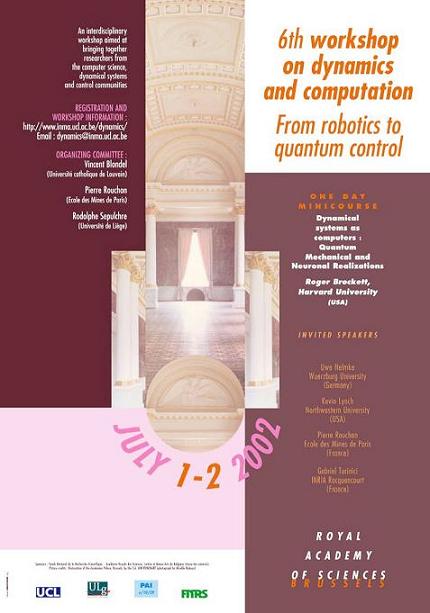Sixth Workshop on Dynamics and Computation
From robotics to quantum control
Royal Academy of Sciences, Belgium
July 1-2, 2002

July 1-2, 2002

An interdisciplinary workshop aimed at bringing together students and researchers from the computer science, applied mathematics, dynamical systems, and control communities.
The first day of the workshop will be an introductory minicourse by Professor Roger Brockett (Harvard University, USA). The second day will consist of invited talks. All talks will be in tutorial format and informal discussions between the participants will be encouraged throughout the two days.
Annual dynamics workshops. This is the sixth of a series of annual workshops held in Belgium on topics related to dynamical systems. The goal of this series of workshops is to gather researchers from different disciplines around the general theme of dynamical systems in a casual and informal athmosphere.
Program
Slides of the presentations
Registration
Location
Organizing committee
Sponsors
July 1 One day introductory minicourse
Roger Brockett, Harvard University (USA).
Dynamical Systems and Computational Mechanisms
9:15 - 9:30 Welcome to the participants and introduction to the
workshop
9:30 - 10:45 Part 1. Examples and Mathematical Background
10:45 - 11:15 Coffee break
11:15 - 12:30 Part 2. Principal components, Neural Nets, and Automata
12:30 - 14:30 Lunch
14:30 - 15:45 Part 3. Precise and Approximate Representation of Numbers
15:45 - 16:15 Coffee break
16:15 - 17:30 Part 4. Quantum Computation
July 2 Invited lectures
9:00 9:15 Jan C. Willems, Katholieke Universiteit Leuven (Belgium)
Introduction
9:15 10:15 K. Lynch, Northwestern University (USA).
Control Issues in Underactuated Robotic Manipulation
10:15 11:15 P. Rouchon, Ecole des Mines de Paris (France).
Flatness based motion planning of quantum oscillators
11:15 11:45 Coffee break
11:45 12:45 G. Turicini, Inria Rocquencourt (France).
Quantum control: from controllability to algorithms
12:45 14:30 Lunch
14:30 15:30 U. Helmke, Wuerzburg University (Germany).
Optimization on Lie Groups: Applications in NMR Spectroscopy
15:30 16:30 R. Brockett, Harvard University (USA).
Closing talk
Attention as a performance measure for control system design
July 1 One day introductory minicourse
Roger Brockett, Harvard University (USA).
Dynamical Systems and Computational Mechanisms
Part 1. Examples and Mathematical Background, PDF, Powerpoint
Part 2. Principal components, Neural Nets, and Automata PDF, Powerpoint
Part 3. Precise and Approximate Representation of Numbers PDF, Powerpoint
Part 4. Quantum Computation PDF, Powerpoint
July 2 Invited lectures
K. Lynch, Northwestern University (USA).
Control Issues in Underactuated Robotic Manipulation, PDF
P. Rouchon, Ecole des Mines de Paris (France).
Flatness based motion planning of quantum oscillators
G. Turicini, Inria Rocquencourt (France).
Quantum control: from controllability to algorithms
U. Helmke, Wuerzburg University (Germany).
Optimization on Lie Groups: Applications in NMR Spectroscopy, PDF
R. Brockett, Harvard University (USA).
Attention as a performance measure for control system design, PDF
Registration is by email. If you wish to participate in this workshop, please send your name and surname, affiliation and email to dynamics@inma.ucl.ac.be. There are no registration fees. The deadline for registration is June 15th, 2002.
The workshop will be held in the main building of the Royal Academy of Science in Brussels. The academy is located in central Brussels, next to the Royal Palace and at walking distance from most facilities. The academy is easily accessible by public transportation (Palais des Académies, Rue Ducale 1, B-1000 Brussels, underground station "Trone" or "Art-Loi").
Vincent Blondel, Université catholique
de Louvain (Belgium)
Pierre Rouchon,
Ecole des Mines de Paris (France)
Rodolphe Sepulchre,
Université de Liège (Belgium)
Belgian National Research Fund (FNRS).
Belgian Royal Academy of Sciences.
Interuniversity Attraction Pole (PAI).